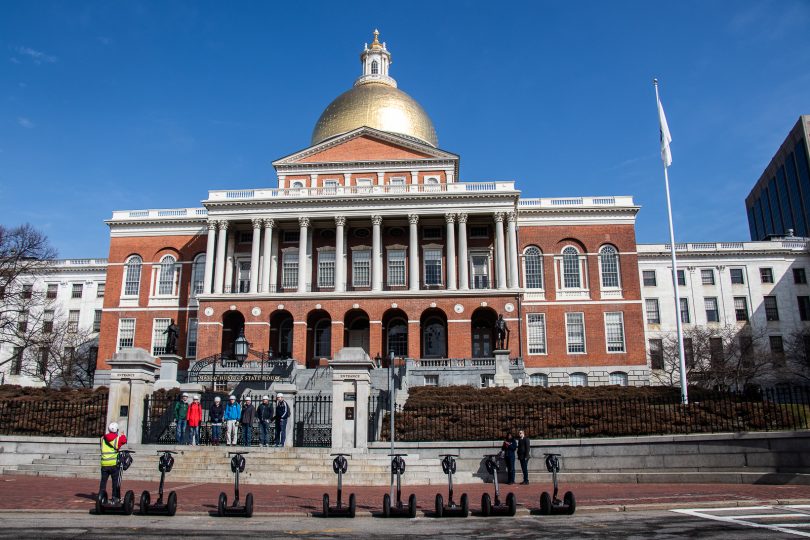By Elise Takahama
BU News Service
BOSTON — In the last few years, local communities have been flourishing with new housing projects: a picturesque 168-unit complex for Chelmsford residents, a living space for seniors in Devens, a row of artist apartments built from a former Fitchburg school that burned down.
Now, the state is proposing legislation to further encourage development projects like these.
Gov. Charlie Baker’s recent bill would allow cities and towns to approve zoning changes by a simple majority vote, rather than the current two-thirds majority. Baker says this change would give municipalities an easier time when deciding to build new housing projects closer together.
The bill, which mirrors one from the last legislative session, comes after the Baker administration implemented the Housing Choice Initiative in 2017, which rewards cities and towns with incentives to produce 135,000 new housing units by 2025. Since then, almost 70 communities have joined the program and $5 million in capital funding has been awarded to 31 communities, according to a statement from the governor’s office.
Despite efforts to increase affordable housing production, Massachusetts has about 170,000 too few rental units for the lowest-income households, according to a National Low Income Housing Coalition report released last month. However, the state does have a higher rate of affordable housing availability compared to the national average, the report said.
The analysis found that there were 46 affordable and available units in Massachusetts per 100 extremely low-income households, defined as those whose incomes do not exceed the higher end of the federal poverty level or 30 percent of area median income. That’s much higher than the national average of 37 units per 100 households.
Baker’s bill aims to help close that 170,000-unit gap.
Bigger cities like Lowell and Fitchburg, however, would most likely not be greatly affected by the voting change, city officials said, because zoning changes are determined by the smaller city councils or planning boards, where the difference between a simple majority and a two-thirds majority is just a couple of people.
Lowell’s City Council, which votes on zoning changes, is made up of nine members, where a simple majority would just be one fewer vote. Fitchburg’s City Council is made up of 11 people, where a simple majority would be two fewer votes.
Rep. Marc Lombardo, R-Billerica, however, is thinking of how smaller communities might be impacted by the bill, and he’s not completely on board.
“I’m a believer that the two-thirds voting is a good thing,” Lombardo said. “When cities and towns want to bring forward proposals that affect zoning, they should have a broad-based support in the community and the two-thirds threshold accomplishes that goal.”
After talking with some of his constituents, Lombardo said he’s gotten mixed reactions in local government. When big zoning and development decisions are made through town meetings, rather than a smaller City Council, as many people as possible should be on the same page, he said.
“I do want to explore the discussion more though,” he said.
But many still agree that Baker’s bill would still be beneficial for the state overall.
“It would help Lowell in that towns in the Merrimack Valley would be more easily able to make changes to affordable housing in their municipalities, which would help ease the regional burden on housing,” said Eric Slagle, director of the Lowell Department of Planning and Development.
About 12 percent of housing units in Lowell are considered “affordable,” which is generally determined by the median income of the area, Slagle said, which puts the city over the state’s affordable housing threshold of having at least 10 percent of its housing be used for affordable units.
As of November 2018, he said, 5,100 of 41,000 homes in Lowell were considered affordable.
Rep. Tom Golden, D-Lowell, agreed that there’s still plenty of need in his district — which includes parts of Lowell and Chelmsford — for both market-rate and “affordable” housing.
“I don’t have a problem with simple majority … The need for all types of housing is something that we should strive to continue,” Golden said. “Overall, it would be a good idea to increase the housing stock for cities and towns.”
Gary Wallace, executive director of the Lowell Housing Authority, also supports the bill.
“The bill is definitely more geared toward suburbs for them to do away with anti-development zoning,” Wallace said. “The city of Lowell doesn’t have those restrictions as much, but I commend the Baker and Polito administration for creating this housing bill. They obviously recognize the need for more low-to-moderate-income affordable housing.”
The housing authority recently formed a nonprofit called RENU, or Revitalization Effort Towards New Urbanism. The goal is to create 100 to 150 new units of mixed-use housing for working class families, Wallace said.
Regardless of voting changes, Bob Correnti, executive director of the Billerica Housing Authority, said there’s still a significant need for affordable housing in his community.
“For families, for seniors, disabled, veterans — there’s a definite need,” Correnti said. “We have a moral obligation to provide safe decent housing for folks.”
This article was previously published in the Lowell Sun.





